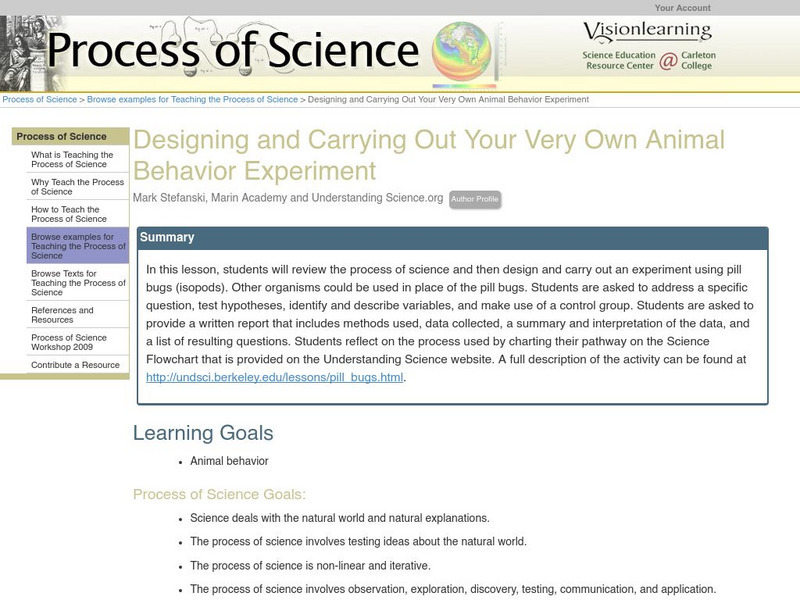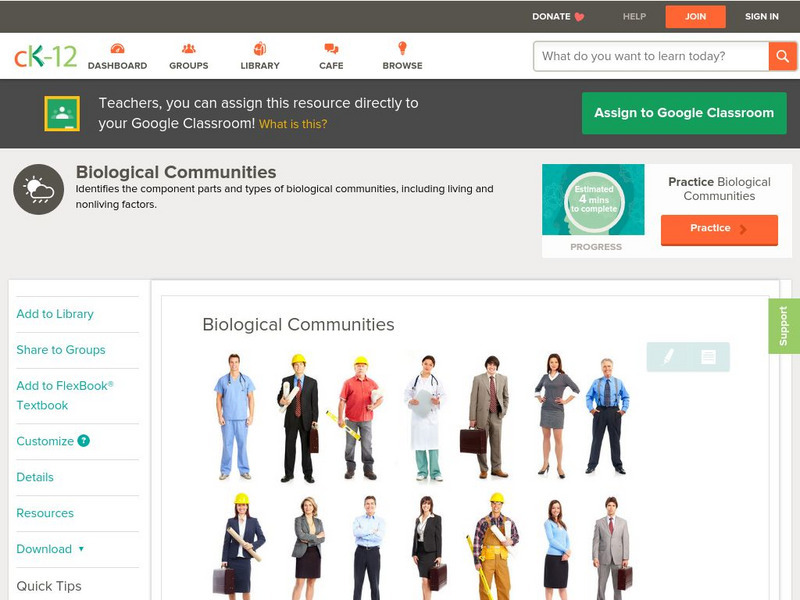PBS
Pbs Learning Media: Animal Shelter Photographer
In this WILD TV segment, a photographer helps find homes for animals up for adoption.
University of Oxford (UK)
The Learning Zone: Animals
Learn all about the study of animals--zoology through this interactive website. You will learn about the processes that make animals alive, what makes them endangered or extinct, and the tree of life.
Sea World Parks & Entertainment
Sea World: Marine Mammal Training
Learn how SeaWorld trains its marine animals.
Sumanas
Sumanas Inc: Life: The Science of Biology: Time Compensated Solar Compass
How do birds know what direction to fly when they fly south for the winter? This tutorial explains circadian rhythm using an experiment performed with pigeons.
University of California
Berkeley Edu: Animal Behavior [Pdf]
Observable coordinated responses to stimuli. Originates with genes that direct the formation of tissues and organs of the animal body (nervous & endocrine systems).
Environmental Education for Kids
Eek!: Creepy Critter Feature
Discover all you can about various "creepy" critters, including bats, snakes, spiders, cicadas, leeches, ticks, moths, pupas, lampreys and fleas.
PBS
Pbs Learning Media: Wild in the City
Learn about how wild parakeets have adapted to city life in this WILD TV video segment.
Society for Science and the Public
Science News for Students: Dolphin Sponge Moms
Some bottlenose dolphins in Australia use a sponge (kind of like a glove) to protect the dolphin when it pokes around on the bottom of the bay. Do they figure this trick out on their own or do they inherit this ability or is it something...
TED Talks
Ted: Ted Ed: Inside the Ant Colony
Ants have one of the most complex social organizations in the animal kingdom; they live in structured colonies that contain different types of members who perform specific roles. Deborah M. Gordon explains the way these incredible...
TED Talks
Ted: Ted Ed: Why Don't Ants Get Stuck in Traffic?
Last year Americans wasted nearly 1 million collective years staring at each others' tailpipes. But there is another species on earth whose population numbers in the trillions, but who doesn't get stuck in traffic - how? It's Ok to be...
TED Talks
Ted: Ted Ed: Inside the Minds of Animals
Do animals think? It's a question that has intrigued scientists for thousands of years, inspiring them to come up with different methods and criteria to measure the intelligence of animals. Bryan B Rasmussen navigates through this...
TED Talks
Ted: Ted Ed: How Do Animals Experience Pain?
How do the animals all around us experience pain? Robyn J. Crook examines pain in both vertebrate and invertebrate animals. [5:06]
NC State University
Nc State University: General Entomology, Elements of Behavior
Behavior is what animals do. It can be defined more precisely as an internally directed system of adaptive activities that facilitate survival and reproduction. Ethology is the scientific study of animal behavior -- particularly when...
Other
Ark Animal Tracks: Careers With Animals
Vocational article about working as an animal trainer for both wild and domestic animals.
Other
Comparative Cognition Lab: What Animals May See
Animals process visual information in distinct ways and vision differs greatly among animal species. Take a look at what what different species of animals may see compared to what we as humans see.
US Geological Survey
U.s. Geological Survey: Save Animal Tracks as Plaster Casts
Engage students in the outdoors by searching for fresh animal tracks and making molds of them. Then investigate which animal might have been there.
McGraw Hill
Glencoe Biology: Basic Behaviors: Self Check Quiz
Try these five multiple-choice questions about the difference between innate and learned behaviors in animals. The quiz is self-checking, and provides hints to the student if needed.
McGraw Hill
Glencoe Biology: Ecological Behaviors: Self Check Quiz
Take this quick quiz to check comprehension of several ecological survival behaviors of animals.
PBS
Pbs: The Shape of Life: Activities and Resources: Phylum Comparison [Pdf]
Students explore eight major phyla of the animal kingdom by comparing body plans, animal behavior, evolution, reproduction, and more. Includes a one-page reference to characteristics by phylum.
PBS
Pbs Teachers: Scientific American: Chimps R Us: Speaking Chimp
Explore the vocabulary and vocalizations in chimpanzee communications and connect them to emotions. Develop and participate in a field study of animal behavior based on observations and interactions with dogs
Science Education Resource Center at Carleton College
Serc: Designing and Carrying Out Your Very Own Animal Behavior Experiment
Students review the process of science and then use the scientific process to design and carry out an experiment using pill bugs.
Other
Elephant Voices: Ele Quiz
Three interactive quizzes on the topics of elephant families, getures, and vocal communication. After each ten-question quiz, the correct answers are shown for review.
Famous Scientists
Famous Scientists: Konrad Lorenz
This article gives the biography of Nobel Prize winner Konrad Lorenz.
CK-12 Foundation
Ck 12: Earth Science: Biological Communities
[Free Registration/Login may be required to access all resource tools.] Provides an overview of biological communities.



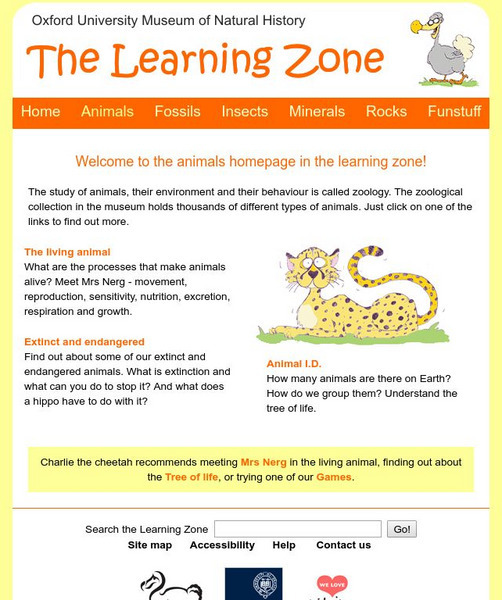






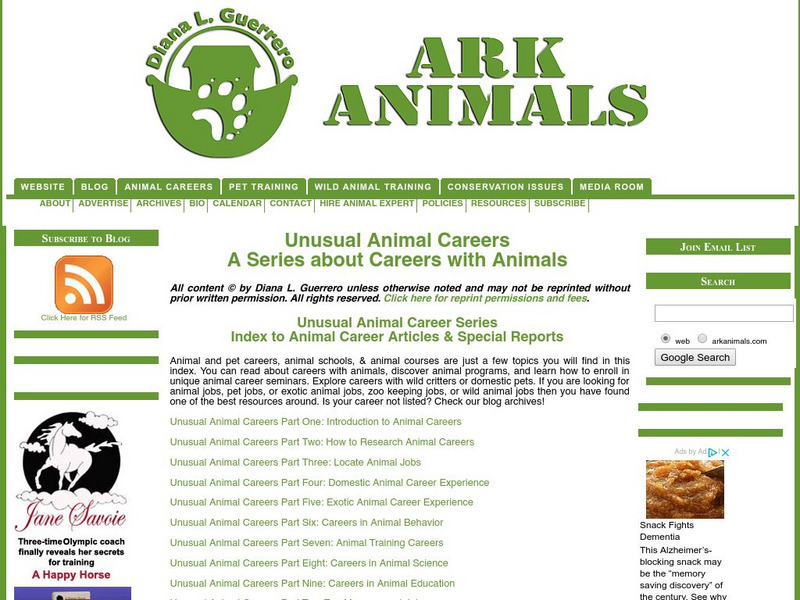
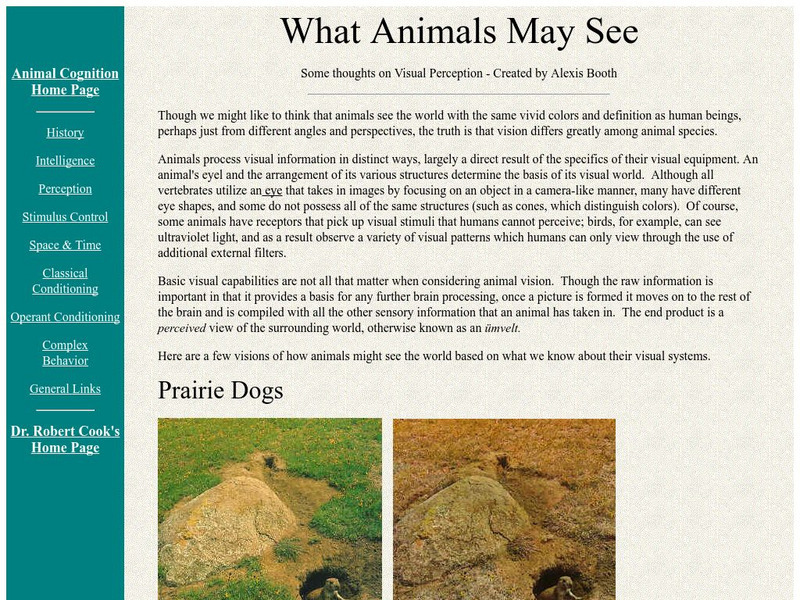


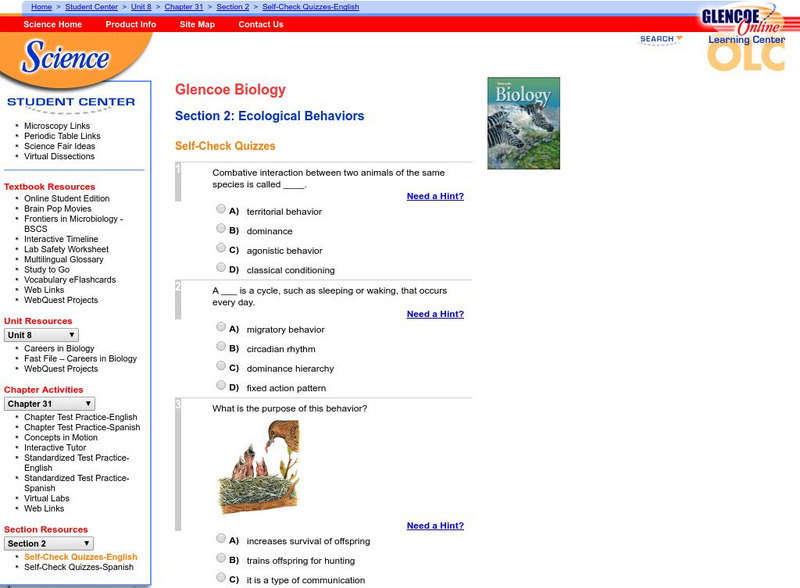
![Pbs: The Shape of Life: Activities and Resources: Phylum Comparison [Pdf] Activity Pbs: The Shape of Life: Activities and Resources: Phylum Comparison [Pdf] Activity](https://content.lessonplanet.com/knovation/original/115994-9311c915222671f24d62d04783ca3890.jpg?1661495768)

